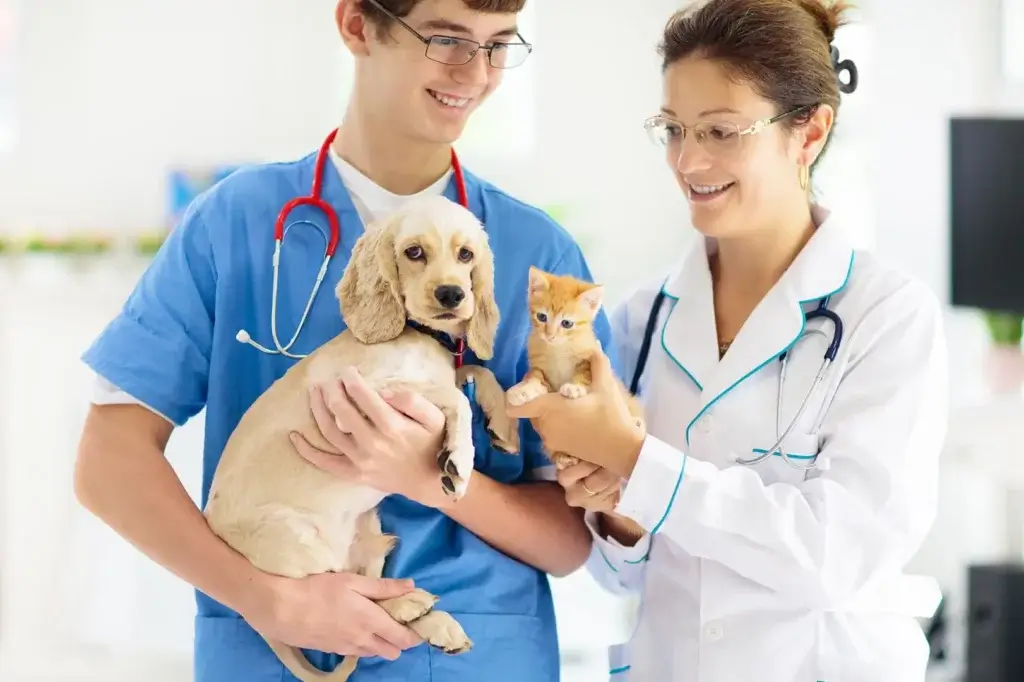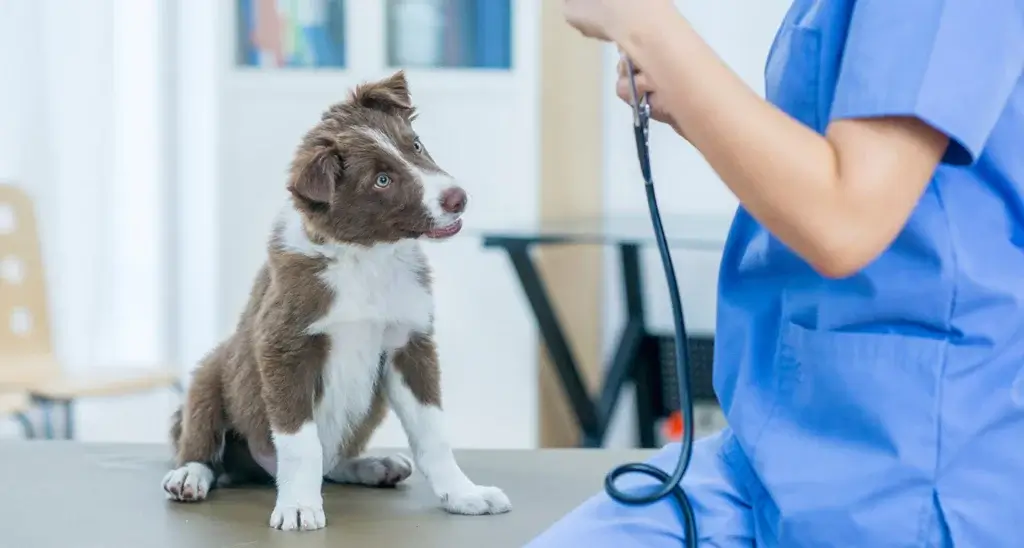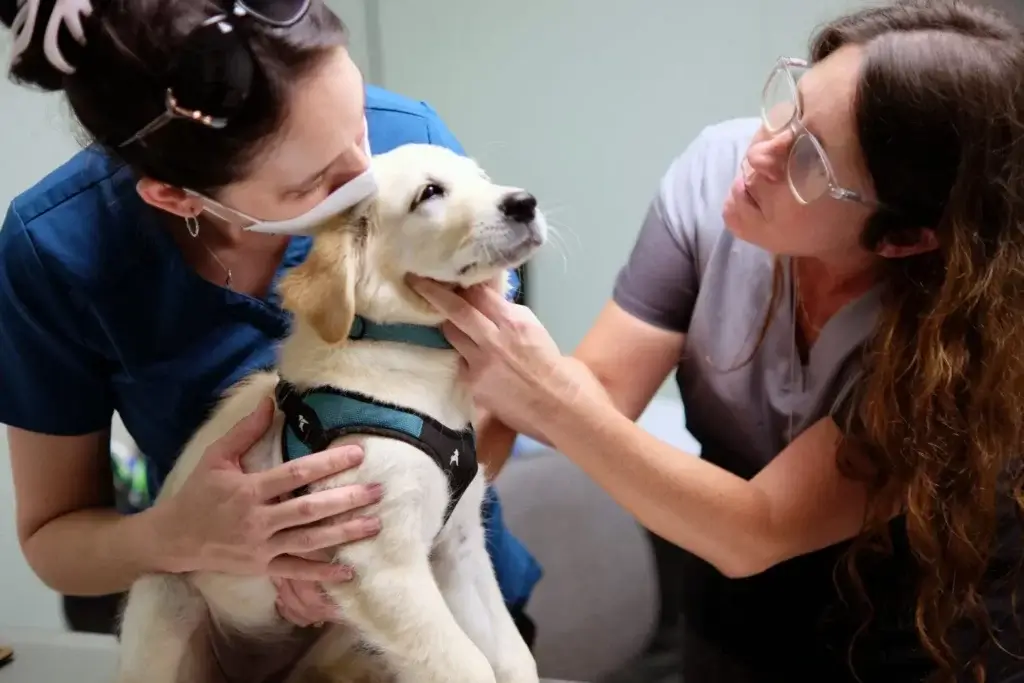🐾 Essential Puppy Care Insights 🐾
| Vet Care | Regular check-ups and vaccinations are vital for lifelong health. Early vet visits build trust and ensure a healthy start. |
|---|---|
| Signs of Health | Keep an eye on appetite, energy levels, urination habits, and look for any changes that might signal an issue. |
| Medications | Administer pills with treats, use syringes for liquid meds, and follow instructions closely for spot-on treatments. |
Remember, the investment you make in your puppy's well-being sets the stage for a joyful and healthy life together. Always consult your vet for personalized advice.
Welcome to puppy parenthood! Dogs bring an incredible amount of joy, but it’s important to remember that they also come with a lot of responsibility. Your furry friend will depend on you for their entire lifetime. You would always be thinking about what treatments puppies need.
A puppy is a lot of work, but definitely worth it in the end. They need top-quality food, cuddles, training opportunities with other puppies, socialization, and routine vet check-ups. It may seem like a lot at first glance, but they will gradually start to become more independent as time passes.
The article aim at educating new pet puppies parents about what vet treatments do puppies need in their initial years of growth.
Importance of Veterinary Care
Routine veterinary care is important for all dogs and should start when they’re puppies. Getting them used to going to the vet at a young age will make it easier on both you and your dog as they get older.
Preventative care is crucial for puppies – regular check-ups and vaccinations can help nip health problems in the bud. Early detection is key when it comes to treating puppy health issues, so make sure to take your furry friend to see the vet on a regular basis.
If you catch a disease early, there’s a higher chance that treatment will be successful. However, if you leave it untreated, the ailment could worsen and become more severe or even deadly. For example, senior pets are more likely to develop cancerous cells.
All dogs, regardless of age, should visit a veterinarian at least once a year. Puppies specifically need to go every 3-4 weeks until they’re 4 months old.
Things to Take Care
1. Signs of Illness
Subtle signs of an illness can be easy to miss, but they can clue you in that something isn’t quite right. General signs of illness include loss of appetite and decreased activity levels. Other more specific signs include
- Vomiting and diarrhea
- Urinating more or less frequently
- Coughing and sneezing
- Discharge from eyes, ears, or nose
- Loss of hair or itchy areas on the skin or around ears
- Problems with the musculoskeletal system may present as stiffness or lameness, such as not putting weight on a leg
2. Giving Medication
Medications in pill or chewable form are generally not difficult to give a dog. Most dogs will consume the pill if it’s hidden in a tiny treat, like cream cheese or peanut butter. You may need to lightly hold the dog’s muzzle shut until you’re sure they’ve swallowed it.
If your dog has been prescribed liquid medication, there’s no need to fret. You can easily administer the dosage by inserting the syringe tip near their back teeth on either side and gently injecting it into their mouth. To avoid spillage, make sure to hold your dog’s head pointing partially upward while doing so.
Spot-on products are applied directly to your dog’s coat or skin. If your dog needs eye drops or ear medication, your veterinarian will show you how to administer it. Make sure to read and follow all label instructions, regardless of the type of medication or how it is given.

3. Vaccinations
It protects our pets from diseases that are dangerous and sometimes fatal. With vaccines, we can mostly prevent these diseases altogether.
Depending on your location and your dog’s individual risk factors, the vaccine requirements will differ. In some cases, certain dogs may not need every vaccine available. This decision should be made between you and your veterinarian after discussing it at regularly scheduled appointments.
The following is a puppy vaccination schedule that is commonly accepted for the dog’s first year of life.
Age of Puppy | Recommended Vaccinations | Optional Vaccinations |
6-8 weeks | Distemper, Parvo | Bordetella |
10-12 weeks | DHPP (vaccines for distemper, adenovirus (hepatitis), parainfluenza, and parvovirus) | Influenza, Leptospirosis, Bordetella, Lyme disease per lifestyle as recommended by veterinarian |
16-18 weeks | DHPP, rabies | Influenza, Lyme disease, Leptospirosis, Bordetella per lifestyle |
12-16 months | DHPP, rabies | Coronavirus, Leptospirosis, Bordetella, Lyme disease |
Every 1-2 years | DHPP | Influenza, Coronavirus, Leptospirosis, Bordetella, Lyme disease per lifestyle |
Every 1-3 years | Rabies(as required by law) | None |
The shots usually cost about $75 to $100 for the primary vaccinations, which are typically given in a series of three when the puppy is 6, 12, and 16 weeks old.
4. Parasite Control
Roundworms, hookworms, whipworms, and tapeworms are the primary intestinal parasites of dogs. These worms damage the digestive tract which then hinders the dog from getting essential nutrients.
Intestinal worms are common among puppies and can be passed down from their mother or contracted easily from birth. Puppies need to be dewormed early and frequently, most often at 2, 4, 6, 8, and 12 weeks of age.

5. Dental Care
Regular teeth cleanings and gum massages are vital for your puppy’s health, which can be best achieved by giving them things to chew on that are meant for puppies. This way, they get the exercise they need while also preventing boredom.
You can help keep your puppy’s teeth and gums healthy by feeding them dry food, providing certain toys (for example, “Flossie”-style bones), brushing their teeth regularly, and following a program of professional dental cleanings and oral care performed by your veterinarian.
6. Grooming
Puppies should be brushed with a good brush, and it’s recommended to start them young. Puppies with thick or shaggy hair coats need extra grooming to prevent mats and tangles. Getting them used to grooming now will make the process easier for both you and your pup later on.
Becoming familiar with having their toes touched will prepare puppies for future nail trimmings. While getting used to having their ears touched gets them comfortable in case they ever need an ear exam from the vet. Puppies seldom need baths. If you must bathe your puppy, only do so using a delicate pet shampoo.
7. Household Hazards
You must take care of your dog by creating a safe space in your house and checking for anything that could hurt them, including poisonous plants, drugs, alcohol, unhappy chemicals like pesticides or cleaning products, antifreeze, and electrical cords.
Puppies that nose around and chew on everything are the most vulnerable, but these products must be kept away from all dogs. Dangerous items (especially electrical cords) can have a nasty-tasting spray applied to them to discourage chewing.
Potential pet (and human) hazards, such as steep staircases, slippery floors, and open windows, should be fixed to the best of your ability.
8. Spaying or Neutering
All dogs that are not being bred should be spayed or neutered. This prevents unwanted pregnancies and eliminates the chances of future medical problems, such as prostate disease in males and uterine infection or mammary cancer in females. Spaying and neutering also often lead to better behavior overall.
We recommend spaying your female dog before its estrus cycle begins, which is around six months old. By doing this surgery earlier on, there are greater medical benefits, and it is much safer for the animal. There’s no need to allow them to go through a heat or have puppies – in fact, it’s not necessary at all.
Male dogs typically get neutered between 5 and 10 months old, based on their breed and size.
9. Flea & Tick Treatment
Flea and tick prevention and treatment are very essential for your puppy’s health. Although prescription medications are usually successful, you should exercise caution with any flea and tick treatment due to the possibility of bad reactions.
Your veterinarian will tell you the best way to treat your dog as well as when it should be done, how much medicinal dosage is required, and the application method.
10. Socializing & Training
Puppies absorb information about their environment rapidly during their learning and development phase. This is the time when they learn how to communicate and behave with people, as well as other pets. It is vital that they encounter different situations and socialize with different types of animals (e.g. cats) and humans during this time.
Gradually allow your puppy to become accustomed to other animals in your home and watch them interact with each other. By comprehending how dogs communicate with each other, including their body language, you will be better equipped to manage your dog’s needs.
11. Diet
Growing puppies have high energy demands and need more calories, fat, protein, vitamins, and minerals than adult dogs. It can be difficult for them to consume enough food to meet their needs through proper nutrition during this critical time in their lives.
Puppies require several daily feedings of specially-made puppy food. The number of daily feedings can be decreased slowly as the puppy ages, but using a name-brand puppy diet should continue until adulthood, which is normally 9 to 12 months for most dogs but up to 2 years in giant breeds.

Conclusion
Puppies are a lot of work, but they are also a lot of fun. With the right care and attention, your puppy will grow into a healthy and happy dog that will be a lifelong companion. I recommend that you consult your veterinarian for specific advice on the care and treatment of your puppy.
Vet Treatment for Pupplies - FAQ
Puppies need a lot of care and attention, and there are a number of treatments that they will need in order to stay healthy. These treatments can include vaccinations, deworming, and flea and tick prevention. Puppies also need to be spayed or neutered as soon as possible to prevent unwanted litter.
Puppies need vaccinations against parvo at 6, 8, and 12 weeks old. They’re vulnerable to the disease until they’ve received all three shots in their vaccination series.
The average puppy will go to the vet at 2-3 weeks old for a health check and deworming and then again at 6-8 weeks old to begin vaccinations, heartworm/flea treatments, receive behavior advice, and get microchipped.
All dogs without medical problems that would prevent immunization should receive vaccinations for rabies, distemper, canine parvovirus, and canine adenovirus-2 (hepatitis), which is usually offered as a combined DAP vaccination.
Puppies need to be dewormed early and frequently, most often at 2, 4, 6, 8, and 12 weeks of age. Once your puppy reaches 12 weeks though, you only have to treat them every three months with an effective all-wormer for the rest of their lives.
Yes, puppies are just as likely to get heartworm disease as adult pets, so the American Heartworm Society recommends giving them a preventive starting at eight weeks old.



